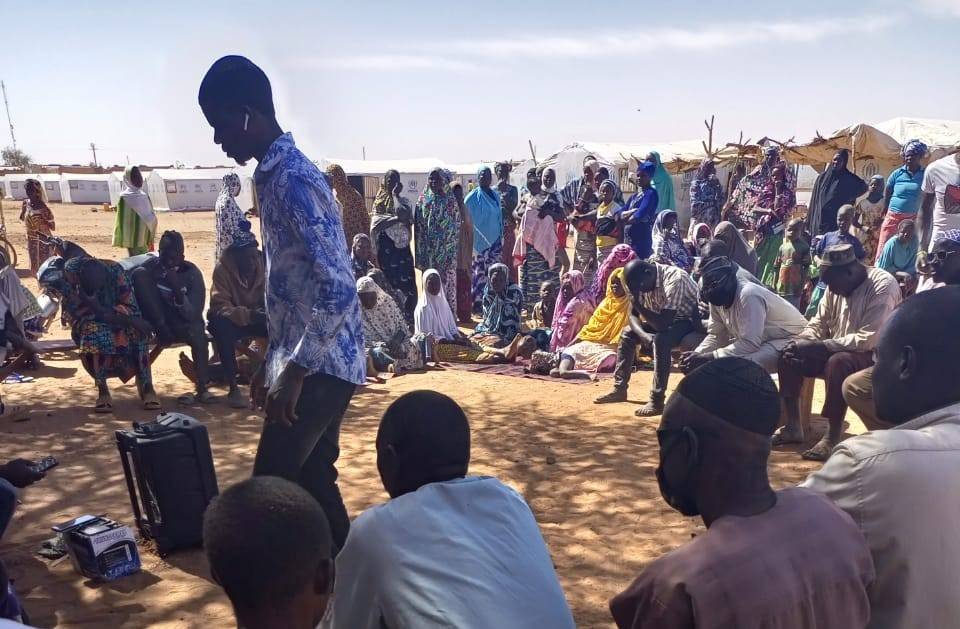A workshop on communication for communities affected by humanitarian crises was organised in Niamey at the end of February. It was set up by Jackie Dalton, our Humanitarian Programme Manager, who explains the importance of improving collaboration between media and humanitarian actors.
What is constructive journalism in humanitarian crises?
It is an approach to journalism that goes beyond conventional practice. Traditionally in crisis coverage, the media provide updates on the situation and expose the problems and needs, but do not tend to focus much on solutions. The idea is to take a more holistic approach, which includes exploring solutions, or at least coping strategies, which communities can adopt, instead of just problems. The media has the potential to reach people quickly, even in remote areas where physical access is restricted. Information can save lives and should be considered an integral component of humanitarian aid.
A constructive approach entails explaining the reality of the situation with accuracy and sensitivity (not sensationalism!), as well as sharing relevant and useful information for affected people. It is an approach that focuses on concrete solutions for the population, with a view to helping them to manage their situation.
What is Fondation Hirondelle's approach to the role of the media in humanitarian crises?
Since its creation in 1995, Fondation Hirondelle has worked in humanitarian crises, seeking to provide reliable information and create spaces for public dialogue, as a contributor to peaceful and stable societies. We are also increasingly focusing on meeting the immediate, practical humanitarian information needs of populations. The programme that was set up for Rohingya refugees in Bangladesh is an example of this evolution. So is the Faso Yafa project, launched in Burkina Faso with Studio Yafa.
Why is a workshop on constructive journalism in a humanitarian context relevant in Niger?
Niger Government and UN reports indicate that this year the country will be in dire straits. According to the Office for the Coordination of Humanitarian Affairs (OCHA), 3.7 million people will need humanitarian assistance in Niger, which is equivalent to 15% of the population. Indicators show the situation is deteriorating rapidly. The security and food crises are intertwined with violence, displacement and the impacts of climate change. We thought it was the right time to propose such a workshop.
Journalists, state and humanitarian actors took part in this event. Why address all these actors at once?
In order to provide useful information to the population, these actors need to work together. Humanitarian actors (including government responders) have specialists who know what advice to give to the population on specific humanitarian issues. Journalists must draw on these experts for reliable information.
A challenge is that when humanitarian actors engage with the media, it is often with the goal of promoting their work or highlighting humanitarian needs, notably to help raise funds. The idea is to try to revisit this approach so that when they are working with local media, they also think about sharing useful information with the population, for example information about the services they provide and how to access them, or measures people can take to stay healthy and safe in the absence of such services.
It is not just about disseminating information. The feedback and reactions of the community are also crucial. It’s important to listen, let people ask questions, share solutions, expose what's wrong and hold authorities to account. Giving a voice to ordinary people has always been at the core of Fondation Hirondelle’s work. It is also important not to forget the most vulnerable, such as people with disabilities or children, who are particularly fragile.
What was the reception of this workshop among the participants?
Firstly, they were happy to get to know each other. They all recognised a problem of trust in the exchange of information. But above all, they realised that they shared the same goal. The role of the media is to be at the service of the population. This is also the case for humanitarian actors. Furthermore, journalists and aid workers both aim to operate under the principles of independence, impartiality and neutrality. This workshop helped people understand that the goals of these sectors are aligned and that it is counterproductive to constantly clash with each other. This does not mean that the media should not report on the weakness and failings humanitarian responses, but that everyone has something to gain from a degree of collaboration, including populations in crisis, who will have access to more useful, timely information.
The practical nature of the workshop was also appreciated. We explored the humanitarian information needs linked to the crisis which is currently unfolding and developed radio programme ideas based on those needs. At the heart of this approach was the idea of putting oneself in the shoes of the population. When we address our audiences, we have to keep in mind that the media are not only for the elite, but above all for ordinary people, many of whom are in very difficult circumstances. We must remember that it is important to put ourselves in their shoes and ask the question : what information do they need?




